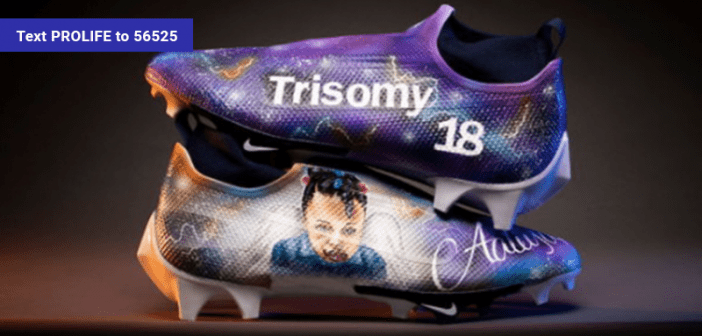This year for the National Football League (NFL) “My Cleats My Cause” event, one player featured a deeply personal and Pro-Life story. Each year, the NFL showcases cleats decorated in honor of a player’s chosen charitable cause; after gameday, the cleats are auctioned, and the proceeds benefit the chosen organization. For Denver Broncos wide receiver Jerry Jeudy, the charitable organization he chose was influenced by the legacy of his sister, Aaliyah.
For his cleats, Jeudy chose the Trisomy 18 Foundation, which supports families facing a Trisomy 18 diagnosis and seeks to find treatments for babies with Trisomy 18. The genetic condition, which affects one in every 2,000 preborn babies in the United States each year, often results in many life-limiting complications, which range widely in number and severity. Many babies with the condition are killed in abortion if Trisomy 18 is detected before birth. Babies who are born with Trisomy 18 often live for only a short time, although some children with Trisomy 18 live for years and even on rare occasion into adulthood.
Jeudy’s younger sister, Aaliyah, was one of the rare children who lived long past the time doctors said she would. Aaliyah was born prematurely and required special care. Doctors told the family that Aaliyah would not live long. Jeudy’s mother, Marie, refused to believe the doctors’ dire predictions, and, according to an ESPN profile on Jeudy, she told the doctors in Haitian Creole, “Ou se yon doktè men ou pa dye,” which translates to, “You’re a doctor, but you’re not God.”
Aaliyah proved her mother right, beating the odds and going home with her family. ESPN reports, “She had tubes to help her breathe and eat, and home nurses to help her live. But Aaliyah was happy and cried only when she was in pain. Jeudy called his little sister ‘Lulu.’ He doted over her. When the home nurses weren’t around, he’d suction the mucus out of a tube in her throat.”
Jeudy’s devotion to his sister was well known. His friend and teammate Brion Byrd recalled, “She [Aaliyah] couldn’t talk or walk, had these tubes in her to help her breathe, but he would tickle her and she would laugh because she knew who he was.” He added, “He would say ‘Hi,’ talk to her, make her laugh and she would be smiling and stuff. His world, that’s who he does it for. That’s who really keeps him going.”
In 2016, Jeudy’s world was shaken when, moments after a big win on the field, his brother told him that Aaliyah had passed away. After seven years of beating the odds, Aaliyah was no longer fighting. After her death, Jeudy tweeted, “I love you sis, you in a better place now. I swear I’m going to make it for you and mommy. #RipAaliyah.”
In the years since her passing, Jeudy has shared about the impact Aaliyah continues to have on him. He said, “She changed my life a lot. She taught me how to fight through adversity.” Elsewhere, he explained, “She motivated me a lot through this whole process. She battled adversity since the day she was born. Doctors said she wouldn’t make it past the age of four. With her fight and determination, she made it past 7. That gave me the drive to never be complacent and always stay driven.”
Fittingly, when Jeudy announced the birth of his daughter in March, he announced that her name is Journee Aaliyah Jeudy, paying tribute to his sister whose legacy continues to touch lives.
The work of organizations like the Trisomy 18 Foundation is life-saving. Often, parents receiving a Trisomy 18 diagnosis are given no hope and pressured to end their child’s life through abortion. There are life-affirming alternatives, including perinatal hospice for babies whose lives are cut short. For many babies, there is also reason for hope when appropriate surgery and intervention are offered. Because of the anti-Life discrimination against babies with Trisomy 18 in the womb, families have to fight all the harder to ensure their child receives care.
Stories like Jeudy’s bring attention to the many families affected by Trisomy 18. Aaliyah’s legacy is one of hope and tenacity in the face of adversity, a legacy which lives on through those who knew her.


